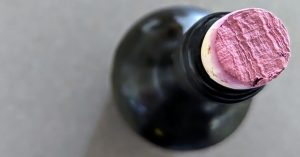
Hang around the wine crowd long enough, and you’re likely to stumble across the term ‘natural wine’.
Natural wines are a recent movement among winemakers for no-intervention winemaking. These wines will go through wild fermentations and do not use any additives. The term isn’t controlled or regulated, meaning that the wine may or may not be “natural”. Natural wines can be wonderfully complex or a little funky, but don’t be fooled, there’s no science saying these wines are healthier for you.
Here’s what you need to know about natural wine.
What Is Natural Wine?
Natural winemaking follows a purist philosophy of nothing added but the grape. This winemaking trend appeals to the health-conscious among us and an increased awareness around healthy lifestyle choices. Newer and older drinkers alike are consuming less alcohol. Natural wines play to this trend.
Natural Wine: Nothing added, nothing taken away
In practice, this means that the winemaker avoids any additions. This includes sulfite additions throughout the winemaking process, except for a small amount right before bottling to stabilize the wine (exploding bottles are bad for business).
The winemaker also foregoes corrections to adjust possible imbalances, for example adjusting acid or alcohol levels.
Another big no-no is adding commercial yeast.
The winemaker depends on ambient yeast that lives naturally on the grape skins or floating around the winery to ferment the juice.
Likewise, the winemaker doesn’t put the wine through any modern winemaking technologies, like sterile filtration.
This step would remove suspended particles that make the wine cloudy as well as remove possible spoilage microbes.
This low-intervention ideology aims to highlight the grape and wine in as natural a state as possible.
Natural wines have found a thirsty niche market. Natural wine retail specialists and natural wine bars are trending hot. There are even natural wine festivals held around the world.
Why Is Natural Wine So Popular?
Consumers assume that these wines are healthier than their conventional counterparts.
3 Things to Know About Natural Wines.

1 Natural Wine Isn’t a Controlled Term
‘Natural Wine’ isn’t a controlled term. Any unscrupulous producer can put the term ‘natural wine’ on a label and market the bottle to an unsuspecting buyer.
If the veracity of a wine’s origin story is important to you, do a little digging on the interwebs to find out more about the producer.
Your wine specialty shop will be able to help you navigate the natural wine market, too.
2 True Natural Wines Will Be Unique
Expect a different drinking experience. These wines – not always, but can – exhibit unfamiliar faults. It may be a little spritzy, earthy with Brettanomyces, and even a little mousey.
Some wine lovers find that these faults add character and complexity to the wine’s overall profile.
Helpful Tip: Here’s what mousiness means in wine.
Here’s a community description of 2014 Yvon Métras Fleurie and a series of tasting notes on Cellar Tracker for this natural wine Cru Beaujolais.
Metras is a top producer in Beaujolais focusing on the Gamay grape. It’s also a pioneer in natural wines from the region.
This wine has a medium ruby color with a notable haze and spritz. Medium body, medium lengthy and red fruit notes. Customers note that the wine is not a great value, and ‘already somewhat mature’. The wine tasting notes show incomplete fermentation, premature oxidation, volatile acidity, and Brettanomyces.
What Do Natural Wines Taste Like?
Becuase the winemaker doesn’t use modern winemaking additives during the winemaking process, expect natural wines to have unique and different aromas and smells. Here are a few natural wine tasting notes?
- “The finish is fresh yet rather high-toned with a slightly rough streak of acetic VA followed by vibrant flavors of juicy dark berries and plummy fruit, some crunchy redcurrant tones, a little bit of stony minerality and a wild hint of lifted bretty funk.”
- “The elevated levels of VA made it quite impossible to actually say that this was Gamay. While I do enjoy funky wines and often Métras wines are really up my alley, this wine was a bit of a let-down; it is just too natty and acetic that I would call it a great wine.”
- “Decanted for 30 mins or so, fairly stinky nose. Strange, but not bad. They are expensive for Beaujolais, but are they worth it?”
- Of note, the natural wine community terms unfaulted natural wines that mimic their mainstream cousins in aroma and taste as entry-level natural wines. This may be a useful phrase for first time explorers of this beverage genre.
3 Natural Wines Aren’t Healthier than Other Wines
There’s no science that natural wines are healthier than conventionally made wines.
In fact, alcohol labels are expressly prohibited from making any statements about healthfulness in the US, regardless of how the product is made.
There’s nothing wrong with buying and loving natural wines, people do it every day. But be aware that notions of healthfulness are unfounded. Wine is alcohol.
Natural wine marketing relies on the consumer’s own interpretation that the product must be better in some way.
Alternatives to natural wine include organic and biodynamic wines. Both terms are regulated by independent national and international oversight bodies.
Prices for organic and biodynamic wines typically reflect the costs associated with compliance requirements, including strict adherence to organic and biodynamic viticulture and winemaking processes.
The wine curious may find that a bottle of organic or biodynamic wine also carries the term ‘natural wine’ on the label.
Today’s consumers are more health-conscious than ever, so it’s no surprise that natural wines are booming business. It will be interesting to see if an oversight body emerges to take on labeling compliance and formalize the ‘natural wine’ term as a guarantor for wine lovers looking for that special experience.

Final Thoughts: What Are Natural Wines? A Crapshoot
If you want a truly unique wine and enjoy the funky and odd, then natural wines should be something to watch out for.
If you want a clean drinking experience everytime you open a bottle, then you probably want to explore natural wines cautiously.
Remember: There’s nothing healthier about natural wines. They’re still alcohol. And the term “natural wine” isn’t controlled and anyone can put it on their label.
Thirsty for More?
Go check out this post on other wine label terms you should know.
Here are a few more terms that make a wine seem healthy: Unfined and Unfiltered.



